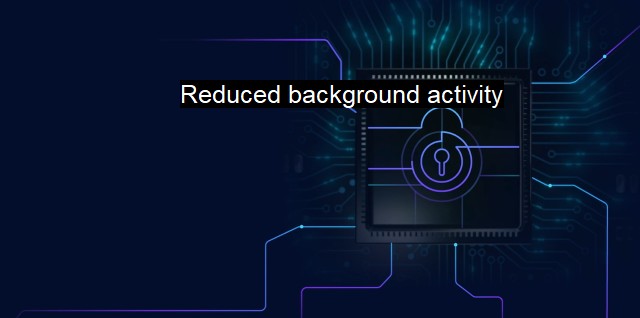What is Reduced background activity?
The Importance of Reduced Background Activity for Cybersecurity and Antivirus Protection
"Reduced background activity" in cybersecurity and antivirus pertains mainly to the demarcation of system resources and the limiting of unnecessary functions to maintain optimal flow and performance of a computer system. Often, applications run several subsidiary services in the background that often lead to data leaks and openings for malicious software, which poses a threat to the security of the system.In order to understand the concept, let us first break down the relevant terms. When referring to a computer system or any device with computational abilities, 'background activity' refers to certain operational processes that occur without user interaction or beyond their perception. Many software applications create background activities like system updates, log files, scheduled scans, web activities, etc. This can sometimes drain system resources and slow the device down, affecting overall performance and productivity.
'Reduced background activity', as the name suggests, refers to a necessary measure taken to limit the amount and scale of these background tasks for better resource management and enhanced security. It requires constant monitoring and pruning unnecessary activities to keep system performance on par, it often involves toning down memory-draining applications or setting preferences to ensure the most sensitive functions receive more resources.
The concept of 'reducing background activity' becomes paramount in the realm of cybersecurity and antivirus application domains. The unchecked background activity could burden the system, making it lethargic and truly compromising its performance. Equally importantly, it can serve as a backdoor for hackers and cybercriminals. Potential threats like malicious software, ransomware, or viruses could secretively use the background as a disguise and penetrate into the computer systems, often unnoticed until the damage is done.
Managing background activity in cybersecurity involves loading only critical antivirus or security applications into a system's memory. It's worth noting that some of these security applications themselves take a significant amount of system resources for conducting regular security sweeps and checks. Thus, keeping such functions strictly in check is all-important in preventing system drain and swift infiltrations.
It's critical to strike a balance between utility and performance when it comes to running algorithms and antivirus programs in the background. A software structure needs to be developed that allows the necessary background processes to run without hoarding system resources. Termed as 'reduced background activity', it is the best mode of operation for many algorithms or systems requiring active real-time defense while not compromising the system performance.
In the contemporary digital age, exploits continue to evolve in complexity, and the decrease in background activity can make a massive difference in battles against such security threats. Through reduction of background activities, especially the unnecessary ones, users can effectively increase the speed of their systems, thereby enhancing their performance. it ensures less vulnerability to cyber threats due to the decreased exposure.
"reduced background activity" in cybersecurity and antivirus domains helps in managing system resources efficiently while combating potential threats by fastening response time. It implies keeping unnecessary and harmful background activities to the barest minimum to lessen CPU load, lessen latency, optimize system performance, and maintain a tightly secured system. The reduction of background activity can be practically achieved, taking a rigorous assessment of system routines, establishing priorities, disabling unwanted processes, and making sure key security checks aren't compromised. Consequently, every modern cybersecurity strategy deems it as indispensable for securing digital spaces against current cyber threats.

Reduced background activity FAQs
What is reduced background activity in cybersecurity and antivirus?
Reduced background activity in cybersecurity and antivirus refers to the feature that allows the antivirus to work with minimal interference to the user's system. It means that the antivirus will only initiate scans or updates when the computer is idle, to avoid slowing down the system during active use.How does reduced background activity benefit my system and enhance security?
Reduced background activity can benefit your system in two ways. First, it reduces the risk of system slowdown caused by antivirus scans or updates, allowing you to use your computer without interruption. Second, it enhances your system's security by ensuring that the antivirus is always up-to-date without impacting your system performance.Can I disable reduced background activity to prioritize antivirus scans and updates?
Yes, you can disable reduced background activity to prioritize antivirus scans and updates. However, this may cause your system to slow down during active use. We recommend leaving reduced background activity enabled for optimal system performance and security.Do all antivirus programs have reduced background activity?
No, not all antivirus programs have reduced background activity. However, it is a common feature in many modern antivirus programs. You should check your antivirus program settings to see if this feature is available, and if it is not, you may consider switching to an antivirus program that offers this feature.| | A | | | B | | | C | | | D | | | E | | | F | | | G | | | H | | | I | | | J | | | K | | | L | | | M | |
| | N | | | O | | | P | | | Q | | | R | | | S | | | T | | | U | | | V | | | W | | | X | | | Y | | | Z | |
| | 1 | | | 2 | | | 3 | | | 4 | | | 7 | | | 8 | | |||||||